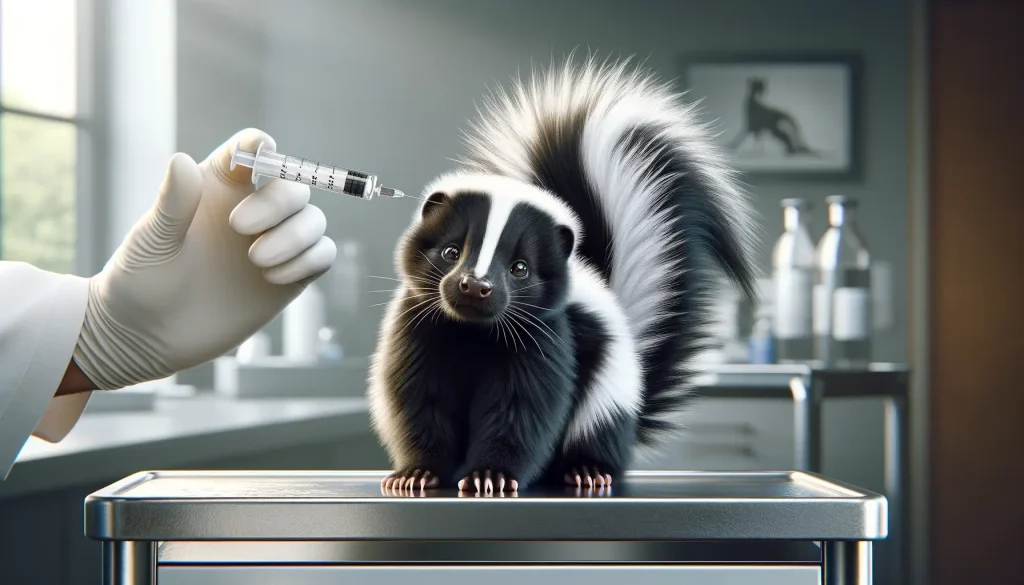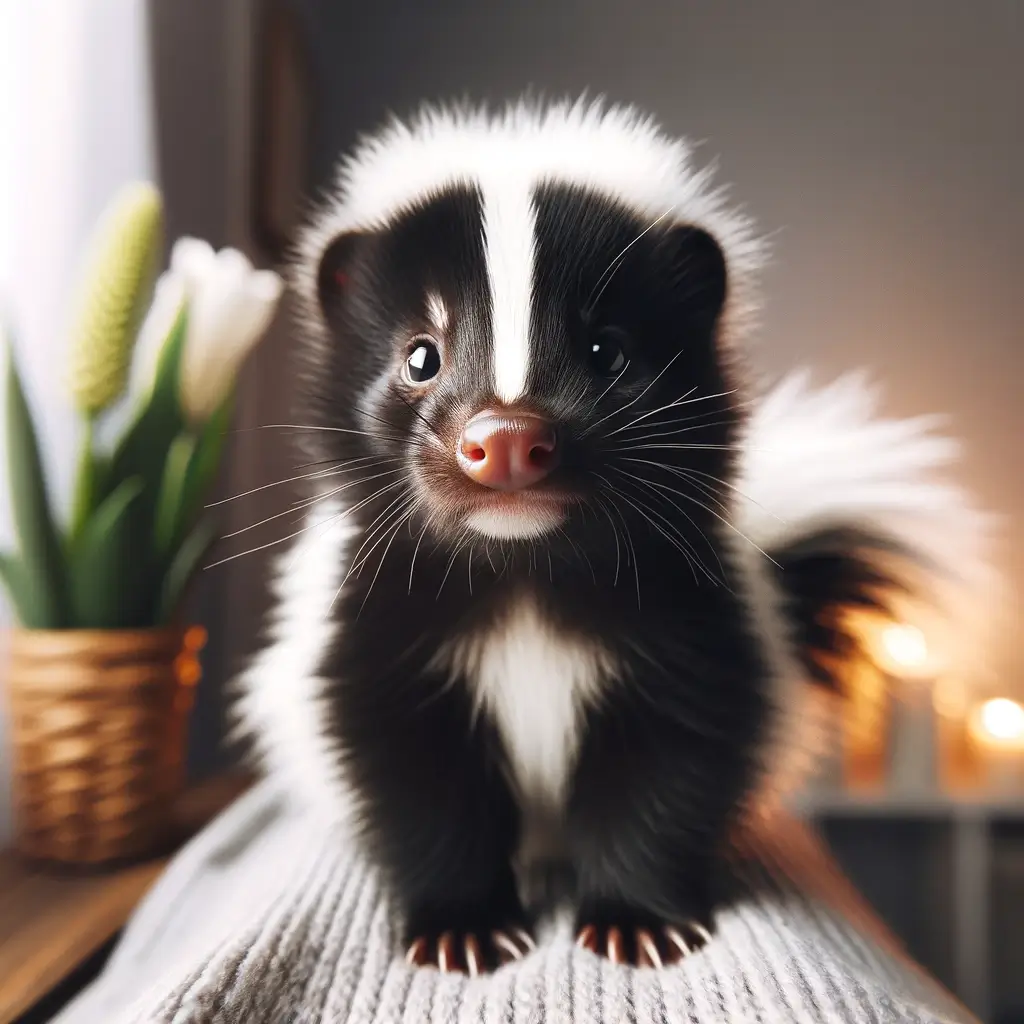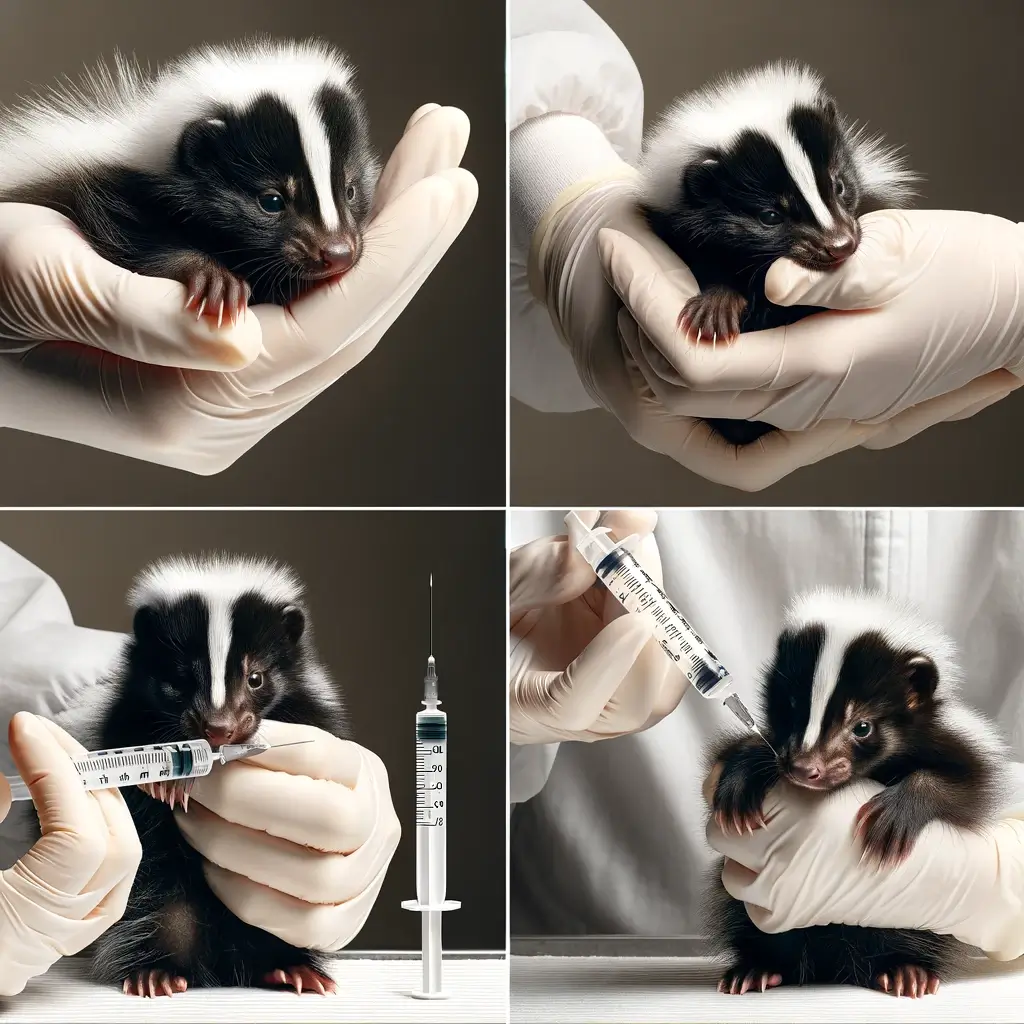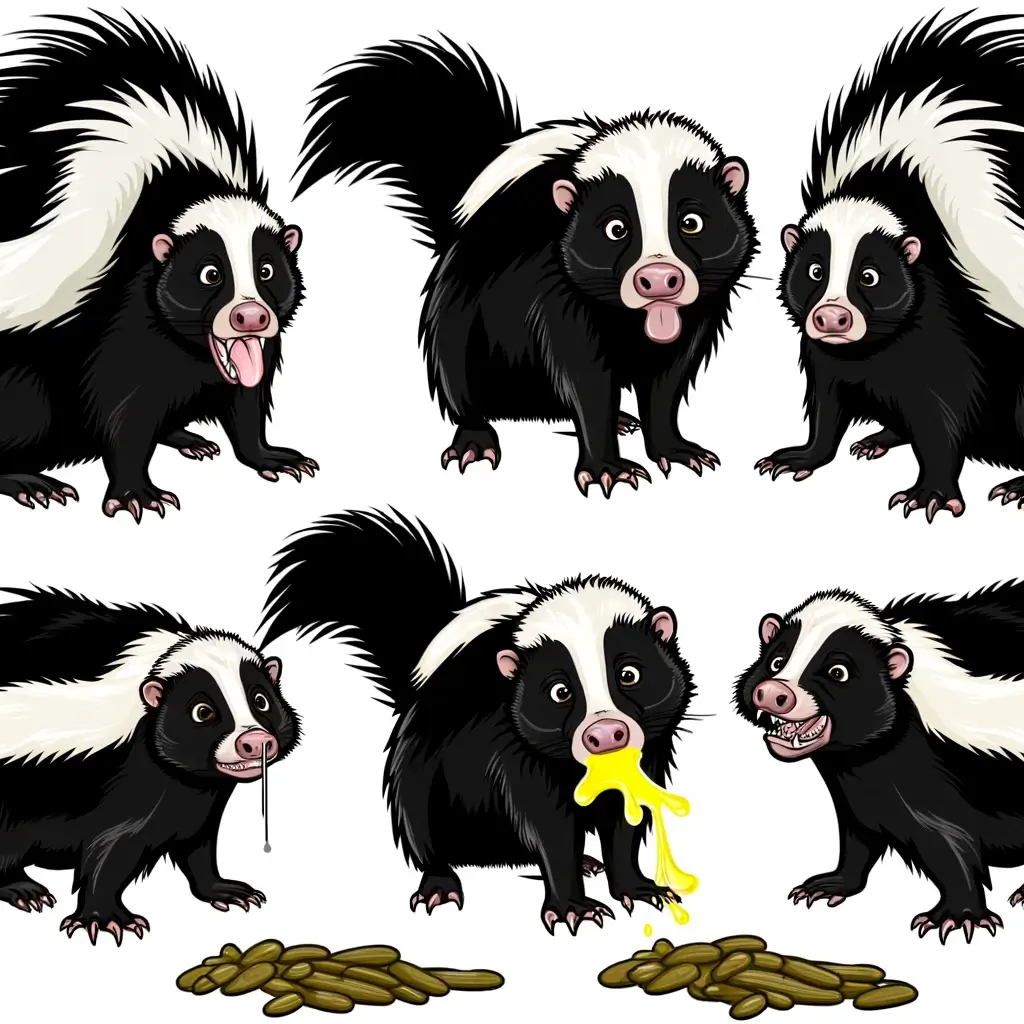
Rabies is a real and present danger, not only to wildlife but also to our beloved pets, and in some rare instances, even purchased exotic animals like skunks. In a shocking revelation, a skunk purchased from a Michigan breeder was found to be rabies-positive. This raises eyebrows for multiple reasons, not least of which is the legal and ethical implications of breeding skunks for sale as pets. While skunks can be legal pets in parts of the US, they’re not in Ontario without special authorization, primarily due to the risk of diseases like rabies that they can carry.
Did you know? In 2023, while Ontario reported only 6 cases of raccoon-variant rabies in skunks, Michigan encountered a startling 17 cases. This disparity highlights the regional variance in rabies risk and underlines the importance of being aware, especially if you’re moving or traveling with pets. Moreover, the often invisible nature of bat bites, a common source of rabies transmission to pets, adds another layer of concern. With 49 cases of rabies found in Ontario bats alone this year, the question isn’t just about legality or morality; it’s about safety. How can pet owners, especially those considering or already owning less common pets like skunks, protect their furry friends and themselves from rabies?
Can Skunks be Safe and Loving Pets?

When considering a skunk as a pet, important questions come to mind about their safety, legality, friendliness, cost, and lifespan. Let’s dive into these aspects to give potential skunk owners a clearer picture.
Can they be a pet? Yes. Despite their wild nature, skunks can be domesticated and have been kept as pets in certain parts of the US.
Are they dangerous? Generally, no—if vaccinated and handled carefully. However, there’s a risk of rabies in unvaccinated skunks, which is a serious concern for both the pet and its owner.
Can you legally own it? It depends on your location. In some US states, owning a skunk as a pet is legal with the correct permits. However, in places like Ontario, you must be an authorized wildlife custodian, and keeping native species as pets is banned without special permissions.
Are they friendly to humans? Yes, if socialized early. Skunks can be affectionate and can form strong bonds with their owners. They need early socialization to be comfortable around humans.
How much do they cost? The cost of purchasing a skunk can range from $300 to $500, not including the additional expenses for their care, such as vaccination, spaying/neutering, and dietary needs.
What is the lifespan? On average, 6 to 10 years in captivity, provided they are kept healthy and receive regular veterinary care.
Should pet skunks be vaccinated for rabies? Skunks can receive vaccines against rabies. However, the risk remains if they’re unvaccinated or pre-vaccination exposure occurs. The case of a skunk purchased from a Michigan breeder who tested positive for rabies underscores the importance of vaccination and awareness.
How long do skunks live? A skunk’s average lifespan ranges from 6 to 10 years, contingent upon receiving appropriate care and living in a stress-free environment.
Rabies Risk in Skunks – Key Information
| Aspect | Details |
|---|---|
| Legal Ownership | Varies by location; illegal in Ontario without authorization |
| Rabies Vaccination | Critical for preventing disease; legal requirement in some areas |
| Socialization Needs | Early socialization essential for domestic behavior |
| Cost | $300 to $500, excluding care and maintenance costs |
| Lifespan | 6 to 10 years with appropriate care |
| Rabies Cases 2023 | 17 in Michigan skunks, 6 in Ontario skunks, 49 in Ontario bats |
Fun Facts to Get to Know Pet Skunk
Did you know that despite their reputation, skunks can be vaccinated against rabies, significantly reducing the risk of disease transmission? This fact is especially important to consider given the growing interest in keeping these unique animals as pets. Understanding the rabies risk is crucial for prospective and current skunk owners to ensure the safety of their pets and their families.
| Fun Fact | Detail |
|---|---|
| Legal Ownership | Legal in some US states, not in Ontario without authorization |
| Rabies Vaccination | Critical for skunks, legally required in some areas |
| Socialization Needs | Early socialization key for domestic behavior |
| Cost | $300 – $500, not including care costs |
| Lifespan | 6 to 10 years with proper care |
| Rabies Cases 2023 | 17 in Michigan, 6 in Ontario, 49 in Ontario bats |
Vaccination: The Shield Against Rabies

The cornerstone of protecting pet skunks from rabies is timely vaccination. In Ontario, the law mandates rabies vaccination for all pets over 3 months of age, highlighting the importance of preventive measures. The unfortunate incident of the skunk purchased from a Michigan breeder testing positive for rabies serves as a stark reminder of the dangers of neglecting vaccine protocols.
It’s distressing to note that the skunk’s exact exposure source remains unclear – a common scenario that underscores the sneaky nature of rabies transmission. Pets, irrespective of being indoors or outdoors, can unknowingly encounter rabid wildlife, such as bats, which are notorious for their unnoticed bites. Given these hidden risks, vaccination emerges as the most reliable form of protection against rabies.
Understanding the incubation period of rabies, which can extend for months without any visible symptoms in animals, amplifies the importance of vaccination. An animal might look healthy but could be harboring the rabies virus, making it a ticking time bomb for transmission. The scenario worsens with wildlife, where monitoring and managing health and vaccination status is almost impossible.
The significant drop in raccoon-variant rabies cases in Ontario to just 6 in 2023, thanks to the diligent efforts of the Ministry of Natural Resources and Forestry, contrasts sharply with the 17 cases reported in Michigan skunks within the same year. This variation underscores the geographical risks associated with rabies and the critical role that vaccination plays in containment.
Moreover, the alarming number of rabies cases found in Ontario bats alone in 2023, totaling 49, further strengthens the call for widespread vaccination. Vaccination isn’t merely a legal or ethical obligation but a fundamental aspect of responsible pet ownership, significantly impacting the health and safety of pets, their owners, and the wider community.
Should I Vaccinate My Pet Skunk?
The incident of the rabid skunk from Michigan should not just be seen as a peculiar outlier but as a cautionary tale emphasizing the relentless vigilance and proactive measures required to combat the ever-present threat of rabies. Let it be a reminder that vaccination, while a simple act, is indeed a mighty shield against one of nature’s most ancient adversaries.
Pros:
1. Unique Companionship: Skunks can form strong, affectionate bonds with their owners, offering a unique companionship different from more common pets.
2. Low Aggression: When properly socialized, skunks tend to have a docile nature, posing less risk of aggression compared to some other exotic pets.
3. Pest Control: Skunks naturally search for insects and small rodents, providing an ecological form of pest control.
4. Vaccination Against Rabies: Skunks can be vaccinated against rabies, reducing the risk of transmission to humans and other pets.
5. Legal Ownership: In some U.S. states, skunks can be legally owned with the proper permits, making them an option for those seeking an unconventional pet.
Cons:
1. Rabies Risk: Despite vaccination possibilities, the risk of rabies exists, especially from unvaccinated or newly acquired skunks.
2. Legal Restrictions: Skunk ownership is heavily regulated or illegal in some regions, including Ontario, due to concerns about rabies and the protection of native species.
3. Specialized Care: Skunks require a specific diet and care routine, which can be more demanding than that of traditional pets.
4. Potential for Disease Transmission: Besides rabies, skunks can carry other diseases transmissible to humans and pets, requiring careful health management.
5. Odor Removal Surgery: While it’s possible to remove a skunk’s scent glands, it’s a surgical procedure that comes with its own risks and ethical considerations.
| Pros | Cons |
|---|---|
| Unique companionship | Rabies risk |
| Low aggression | Legal restrictions |
| Pest control | Specialized care |
| Vaccination against rabies | Potential for disease transmission |
| Legal ownership | Odor removal surgery |

While skunks offer an intriguing alternative to traditional pet ownership, there are significant considerations to weigh. Legal restrictions, health implications, and care requirements must all be carefully assessed. For those willing to navigate the complexities associated with skunk ownership, these unique animals can make rewarding companions. However, prospective owners must prioritize the health and well-being of their pet skunk, ensuring compliance with legal requirements and best practices for exotic animal care.
Beginner Guide to Raising Quail at Home
What are the Signs of a Dog Concussion?
What Causes Your Dog’s Ears to Smell Bad?
When your dog’s ears start to emit an unpleasant odor, it might leave you puzzled…
Methimazole Treatment for Cat Hyperthyroidism
Methimazole plays a crucial role in managing feline hyperthyroidism, a condition marked by an overactive…
Got Hummingbirds in your Backyard? Here’s How to Care for Them.
Why Does Your Cat Pee Outside the Litter Box?
Cat’s Litter Box Issues It’s not uncommon for cat owners to face the frustrating dilemma…




